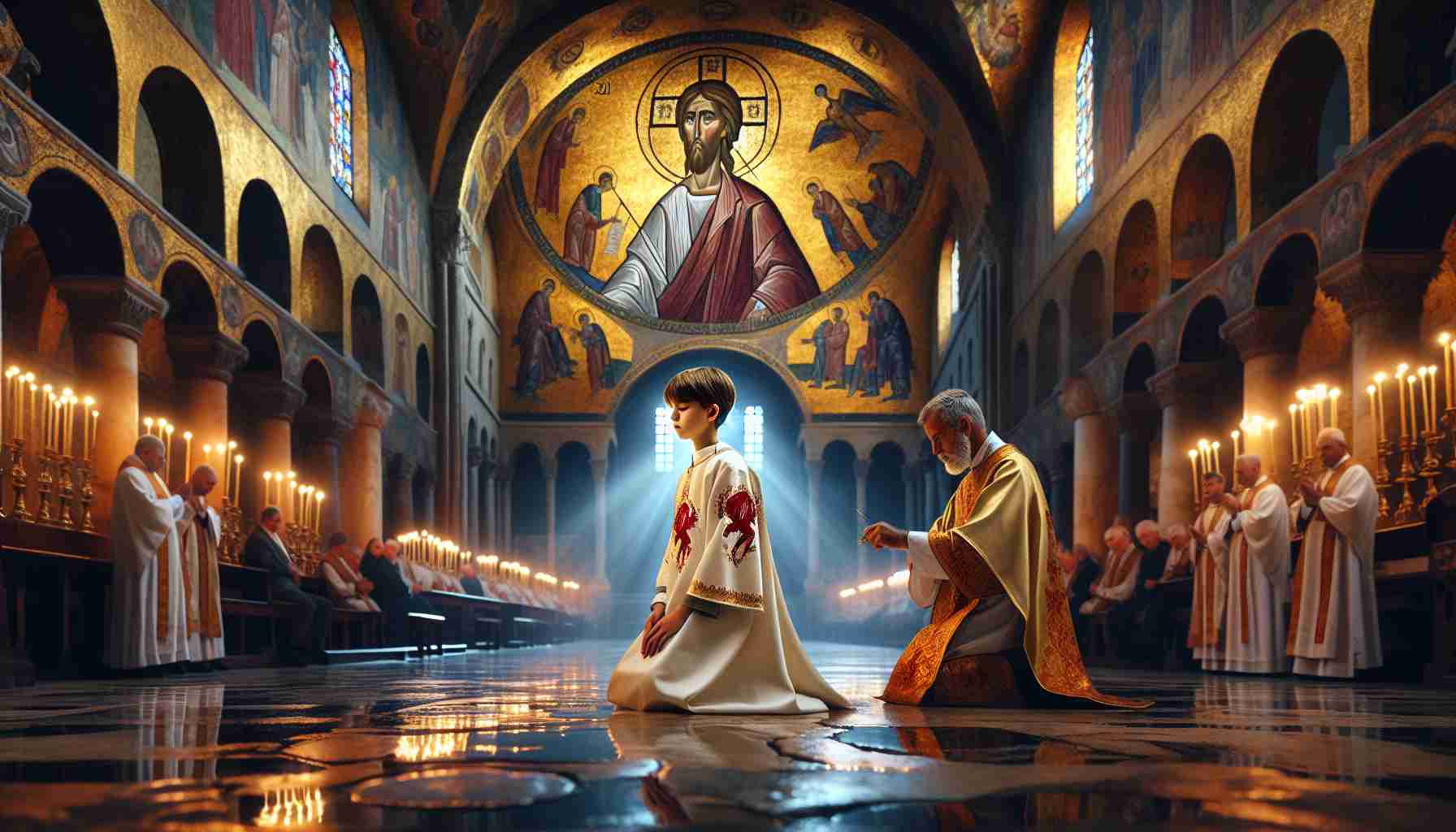

The morning sun broke over the palatine hills like the golden crown awaiting the boy. Rome stirred—brassy hymns echoing through the Pantheon’s portico, mingling with the scent of incense drifting from the Lateran. Pilgrims crowded the Via Sacra, murmuring prayers, eyes turned east to the basilica of Saint Peter, where marble columns stood like sentinels between earth and God.
On this May morning in the Year of Our Lord 996, Otto stood beneath the towering bronze doors of the old Constantinian basilica, his breath visible in the early air. Sixteen winters had not dulled his gaze, nor softened his frame too gently. Sharp-chinned, with the glint of Saxon steel in his bearing and the olive dusk of his mother’s Byzantium in his skin, he was both German prince and Eastern son—Rome’s unlikely heir.
Clad in a white tunic embroidered with crimson lions, he entered the nave, each step echoing in the cavernous vessel of heaven. Beneath the golden apse mosaic—where Christ enthroned cast down his stern yet merciful eyes—the pope waited, mitred and solemn. The boy knelt, as his mother, Empress Theophanu, watched from the shadows. A stone of Constantinople's imperial fire, she wore her station like armor, her fingers tight around the psalter from which she had often read: "How can a young man keep his way pure? By guarding it according to Your word."
They had traveled far for this moment. Across the Alps in shawled processions, fed by black bread and the Gospels. Death had shadowed them—the previous pope, John XV, had died before Otto could reach him. But now a new Pontiff, Gregory V—blood of his blood—stood to anoint him.
Oil traced the sign of the cross across Otto’s brow, chest, and hands. Trumpets answered heaven; the crown, forged in the likeness of Charlemagne’s, descended. But Otto’s eyes were not on gold. They searched the apse for the feet of Christ, serene above the saints, and whispered something only Theophanu could hear.
“Not for glory, but for Him.”
Thus crowned Holy Roman Emperor, he pledged himself not to war nor dominion but to Christendom’s revival. His court would be modeled not on the bloodied courts of German dukes but on the righteousness of David and the wisdom of Solomon. Beneath gilded coffered ceilings, he summoned monks, historians, scholars from Ravenna to Aachen to recopy ancient scripture, to rebuild ruined basilicas, to reform the Church that had grown fat on bribes and fearful of truth.
They called it the Renovatio Imperii Romanorum—the Renewal of the Empire of the Romans. But it was more than parchment or doctrine. It was the seeking of a boy whose compass was not conquest, but scripture.
In the Lateran Palace, Otto built a chapel with walls of polished porphyry and a floor of shifting mosaics. There he held vigils, kneeling until dawn bled through the latticed windows. Psalm 119 was ever on his lips—prayer in the tongue of his mother, in Latin, in German, whispered in the silence of stone corridors.
There lived opposition, of course. The Roman nobility snarled behind their silks, unwilling to bow to a northern child. Others, envious of Theophanu’s shadow over imperial policy, called her a foreign serpent poisoning the West with Eastern pride. Yet in every whisper of rebellion, Otto heard only a summons to humility. “Blessed are the pure in heart,” he would say, “for they shall see God.”
Rome had a habit of remembering its emperors with statues and triumphal arches. But Otto left no colossal marble effigy. Instead, he gave monks in ruined abbeys the tools to teach again. He reestablished papal authority with caution and Christian clarity, defending the throne of Peter with patience, not swordplay.
In the crypt of St. Bartholomew on the island of the Tiber, Otto often prayed alone. There, beneath candlelight and Roman brick, he touched the stone said to mark the apostle’s martyrdom. Whatever doubts he bore, he brought them there. Once, a priest found him weeping—not from fear, but from the crushing weight of holy ambition.
“This empire will outlive me,” he said, “if its cornerstone is Christ.”
But time allowed him little. Fever would claim his mother less than two years later, and Otto, still barely a man, would walk cloaked in black beside her coffin. By 1002, he too had fallen—some say by poison, others say plague. He was twenty-two.
Yet centuries remember him not as a boy-emperor lost to illness, but as the last breath of a Rome that dared to dream its destiny lay in sanctity, not steel. Scholars still recite his canon law reforms. Monasteries from Saxony to Sicily bear texts bearing his seal. And upon the crown of emperors yet unborn, he etched one immutable truth: purity of heart paves the path to greatness.
In the silence of Saint Peter’s, where the bronze doors forever echo footsteps of the faithful, one can still hear, if inclined to listen, the whisper of the boy king's vow:
“To serve Christ, and thereby, to crown an empire with light.”